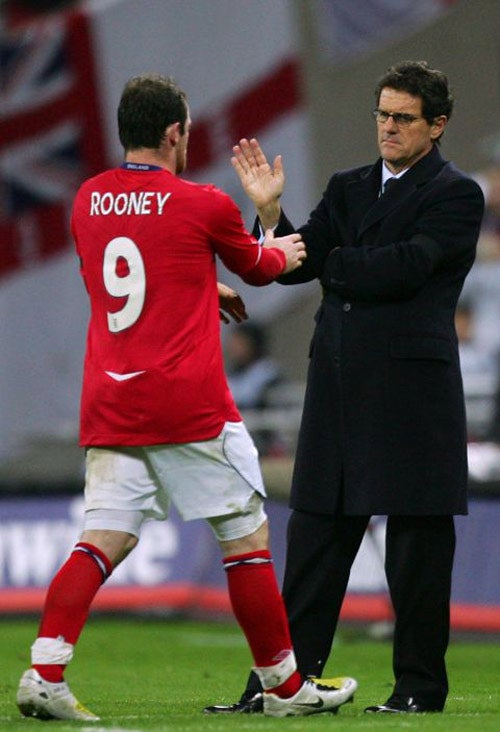James Lawton: Nothing too fancy, but not bad for starters

Your support helps us to tell the story
From reproductive rights to climate change to Big Tech, The Independent is on the ground when the story is developing. Whether it's investigating the financials of Elon Musk's pro-Trump PAC or producing our latest documentary, 'The A Word', which shines a light on the American women fighting for reproductive rights, we know how important it is to parse out the facts from the messaging.
At such a critical moment in US history, we need reporters on the ground. Your donation allows us to keep sending journalists to speak to both sides of the story.
The Independent is trusted by Americans across the entire political spectrum. And unlike many other quality news outlets, we choose not to lock Americans out of our reporting and analysis with paywalls. We believe quality journalism should be available to everyone, paid for by those who can afford it.
Your support makes all the difference.There were some shouts for David Beckham but they were as isolated as the scattering of cries breaking the 23-second silence for the Busby Babes. The German referee was plainly nervous about running to the full minute and wisely decided to end the tribute on a note of what might have been described as fragile decency.
By way of the sharpest contrast, however, it was plain the man who left out England's former captain and sentimental favourite was, rather like his new team, in no kind of hurry – and certainly not to abandon anything like a basic principle for the amusement of a restive crowd.
Fabio Capello probably didn't even hear the murmurs of reproach over the discarding of Beckham, but had he done so they would surely have had minimal impact. Capello doesn't listen to crowds, nor much else that does not belong among his own carefully fashioned priorities, and anyway, soon enough Beckham's replacement, David Bentley, was settling rather beautifully into his first starting appearance for England.
Apart from producing some moments of quite startling originality, Bentley, along with an astounding number of team-mates, gave himself a stunning ambition. It was to pass the ball to a team-mate with a little thought and precision.
For 20 minutes in the first half such a fancy notion created something of an entertainment impasse – and it did not help that a free-kick from Beckham's favourite position on the right was delivered with guileless nonchalance. However, Bentley delivered two moments of spectacular compensation.
Twice he reduced the left flank of Switzerland's defence to marking shadows before putting across brilliantly conceived crosses, which lacked only a formal coup de grâce, first from Wayne Rooney, then substitute Peter Crouch.
This was always going to be an exploratory exercise by the diagnostic master of Italian football, but if the tempo in the first half was sometimes unacceptably measured for English taste, there was a constant thread. It was that idea of retaining possession, moving in smaller and much more coherent groups than those which melted so disastrously against Croatia in England's previous match here, and it touched almost every Englishman on the field.
Bentley's subtlety was one gift to the new England manager and so was the bite of Joe Cole before he was replaced.
This was no aria of fine football arts but it may just have been an earnest hint of a new phase of English football – one in which players are given not just some old-fashioned discipline but some classic prompting in the basics of teamwork and passing rhythm.
Il Capo was far from effusive with his players after they survived the crisis that came with a Swiss equaliser from Eren Derdiyok and there were some good, if understandable, reasons for this. England did not make some overwhelming statement of new authority. At times they were uncertain at the back, with Wes Brown particularly discomforted in the early going. But there was, undoubtedly, more than a hint of a new instinct to run and pass.
England's opening goal, indeed, was a sweet statement of gathering confidence. Bentley, for once, was less than masterful with his delivery but Brown worked the ball to Steven Gerrard. He released Joe Cole, who, after exquisitely beating his marker, presented Jermaine Jenas with the easiest of chores in front of goal. It seemed like the result of a collective desire to pass and make space for each other – and suddenly Capello's first ordeal of introducing himself and his values seemed much less of a trial.
Gerrard was voted man of the match, something of a stretch against the creative intelligence of his young team-mate Bentley, but there was something impressive about the auditioning captain. He did not make rampaging runs. He did not go for the spectacular but some of his work carried a confidence, and a patience, which has not been so notable in his efforts to strike a relationship with team-mates like Beckham and Frank Lampard.
Did we really have the seeds of a new England? As Capello was quick to say, there was so much more work to do, so much more understanding to develop. But if there were not even the beginnings of a guarantee, there were, no doubt, signals of genuine promise.
Rooney played with a passion that will bring greater rewards. There were times he seemed set on repeating his first impact on Capello – when he single-handedly won an FA Cup tie against Aston Villa. Rooney strived to produce evidence that he can take hold of any game, and perhaps tried too hard.
No one, though, was going to complain about such a fault at the dawn of Capello's attempt to redesign England's football. There was, certainly, a sense that pleasing the new boss had become an object of most serious ambition. In this, at the very least, it was a decent start.
Join our commenting forum
Join thought-provoking conversations, follow other Independent readers and see their replies
Comments